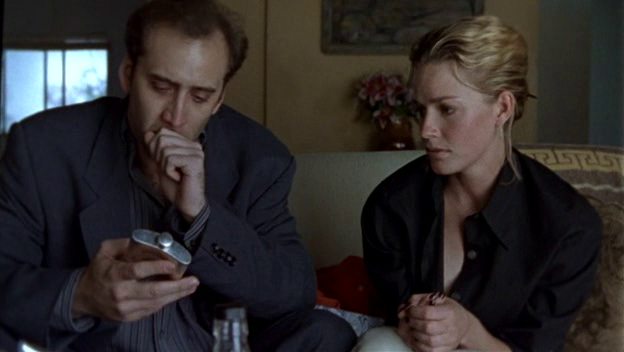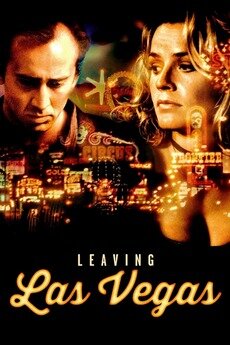The Travolta/Cage Project #46 Leaving Las Vegas (1995)
I like to say that people win awards not necessarily for doing the best work but rather for doing the most work. Oscars almost invariably go to the hams that give the biggest rather than the finest performance. That certainly holds true of Nicolas Cage’s performance in 1995’s Leaving Las Vegas.
Cage won the most prestigious prize in all of acting because he gave a performance that was punishingly intense even by his standards but also because Leaving Las Vegas is exactly the kind of movie that wins awards. It’s an unrelentingly grim exploration of the dark side of sex work and alcoholism, a dour tour de force that looks long and hard into the void without flinching.
Conventional wisdom holds that the key to delivering an authentic drunk performance is to resist at all costs the temptation to big and broad and theatrical and instead underplay drunkenness. This leads to more nuanced, sophisticated performances but it’s also true to the psychology of addiction as well.
After all, when someone is drunk they generally want to convince the world that they’re sober. We live in a culture and society that doesn’t just enable alcoholism but actively promotes it. Where would the liquor industry be in a world full of teetotalers and folks who know when to say no? Yet we also look askance at people who are excessively drunk as childish, unprofessional, messy and embarrassing.
We’re Americans so we are supposed to drink, particularly if we live in the Midwest, as I have most of my life. But we’re also supposed to know when to stop, for our own sake as well as our loved ones and society as a whole, on both a micro and macro level.
When we’re completely hammered, we generally try to convince concerned onlookers that we’re merely tipsy, that we’ve had a drink or two, or three, but that we are completely in control of our faculties and consequently should be given our car keys back. I’m not talking about myself of course, as I do not know how to drive.
On a similar note, alcoholics often labor under the delusion that they’re not alcoholics. They assure friends and family that they can stop at any time, that they just enjoy drinking and have everything under control.
That is most assuredly not the case with Ben Sanderson, the self-destructive agent played by Nicolas Cage here. He knows damn well that he is a hopeless alcoholic careening purposefully towards oblivion. He knows he has a problem. He knows that he can’t stop. He knows he can’t handle drinking. The concept of moderation does not exist in his booze-poisoned mind. For a man like Ben, there is no such thing as “cutting back.”
Ben does not pretend to be sober. He does not pretend that he is not an alcoholic. On the contrary, he embraces both his unfortunate existential identity as an alcoholic and his impending doom once he finally succeeds in his life’s goal to drink himself to death in Sin City, which has seldom looked or felt sadder or more lonely than it does here.
Leaving Las Vegas opens very deep into its protagonist’s long, irreversible slide into alcoholic oblivion. Like the morbidly fascinating monster he played in Vampire’s Kiss (a better, if less Oscar-friendly performance, in my opinion), Ben works as an agent, or at least he does until a boss who looks at him the same way seemingly everyone else does—with a combination of mortification, pity, disgust and embarrassment—fires him and gives him money to go away forever.
Ben seems to have burned all his bridges in Los Angeles. He’s an alcoholic but he’s also a mess careening blearily from one humiliation to the next. He needs to get the hell out of town but a fresh start seems impossible for such a broken, tormented soul. So he decides to go to Las Vegas to drink himself to death in a city where where no one knows him or his unfortunate history.
He wants to lose himself in a place for lost souls, to complete the long, harrowing, agonizing process of complete and total self-destruction in a place where such an endeavor is not just allowed but encouraged. In Las Vegas Ben meets Sera (Elisabeth Shue, in an Oscar-nominated turn), a gorgeous prostitute with a vicious European pimp (Julian Sands, in the Julian Sands role) and a world of damage and trauma and despair of her own.
Ben and Sera’s relationship begins in the usual way, with Ben offering to pay for Sera’s sexual services but it quickly becomes apparent that due to a combination of liquor and depression, Ben has a hard time (no pun intended) keeping an erection or achieving orgasm. It’s yet another aspect of his life that alcohol has destroyed.
Yet Sera, who is Christ-like in her selflessness and masochistic in her willingness to put the needs of others above her own, accepts Ben in all of his brokenness. When Ben asks her never to ask him to stop drinking, she acquiesces in a way that seals both of their fates: he will die and die soon but with the all-important consolation of getting to know true love and acceptance before he passes away.
In Leaving Las Vegas true love looks an awful lot like enabling. In a deeply ambivalent, incredibly powerful sequence Sera even gives the impotent, suicidal alcoholic she’s in love with a flask to assist him in the long, involved task of destroying his body, mind and soul with fatal levels of alcohol.
In that respect, Leaving Las Vegas is a curious, strangely affecting combination of misery porn and seedy wish fulfillment.
It’s a testament to the depth, gravity and complexity of Shue’s performance that she does not emerge as impossible figure of pure fantasy: a supermodel-gorgeous secular Saint who totally accepts her boyfriend’s impotency but is happy to give him a blow job whenever he’d like and pours booze all over her naked breasts in realization of Ben’s fiercest sexual desire. This is Shue’s movie as much as it is Cage’s although her staggering beauty can sometimes be a little distracting. Sera spends a lot of the film unsuccessfully attempting to get men to have sex with her, Ben first and foremost (although in that case at least, the spirit is willing, but the body is not able) but also potential customers, perhaps most notably a deeply offended family man played by R. Lee Ermey.
In Las Vegas seemingly everything is not just possible, legal and allowed but actively encouraged, including hunting humans for sport. Yet everywhere Ben and Sera go they are not so politely asked to leave because they’re too sloppy and too dark even for a place like Las Vegas.
For reasons known only to Figgis, Leaving Las Vegas’ supporting cast is so inexplicably full of famous faces in bit parts that at times it begins to feel like a miserablist version of It’s a Mad, Mad, Mad, Mad World with Richard Lewis, Steven Weber, Valerie Golino, Carey Lowell, Vincent Ward, Bob Rafaelson, Julian Lennon, R. Lee Ermey, Laurie Metcalfe, Mariska Hargitay, French Stewart, Danny Huston and Lou Rawls taking the place of the top funnymen of the 1950s and 60s.
I’m not entirely why all these random celebrities are in the film. It’s not exactly a, “Hey, I know that guy!” kind of movie, but these weird blasts of star power don’t detract from the film’s raw, visceral impact. This is strong stuff, straight, no chaser, and time has done nothing to dim its tremendous power.
For all of its artistry and emotion, Leaving Las Vegas would probably not make a list of my top twenty Nicolas Cage movies. His performance might not either but the Academy did not see fit to honor superior performances in less Oscar-friendly fare like Vampire’s Kiss and Mandy.
Then again I’ve only seen Leaving Las Vegas twice: when it came out and again for this column and something tells me that it will be a movie that stays with me in the same way as Cage’s best and most enduring masterpieces.
Help ensure a future for the Happy Place during an uncertain era AND get sweet merch by pledging to the site’s Patreon account at https://www.patreon.com/nathanrabinshappyplace
Also, BUY the RIDICULOUSLY SELF-INDULGENT, ILL-ADVISED VANITY EDITION of THE WEIRD ACCORDION TO AL, the Happy Place’s first book. This 500 page extended edition features an introduction from Al himself (who I co-wrote 2012’s Weird Al: The Book with), who also copy-edited and fact-checked, as well as over 80 illustrations from Felipe Sobreiro on entries covering every facet of Al’s career, including his complete discography, The Compleat Al, UHF, the 2018 tour that gives the book its subtitle and EVERY episode of The Weird Al Show and Al’s season as the band-leader on Comedy Bang! Bang!
Only 23 dollars signed, tax and shipping included, at the https://www.nathanrabin.com/shop or for more, unsigned, from Amazon here






